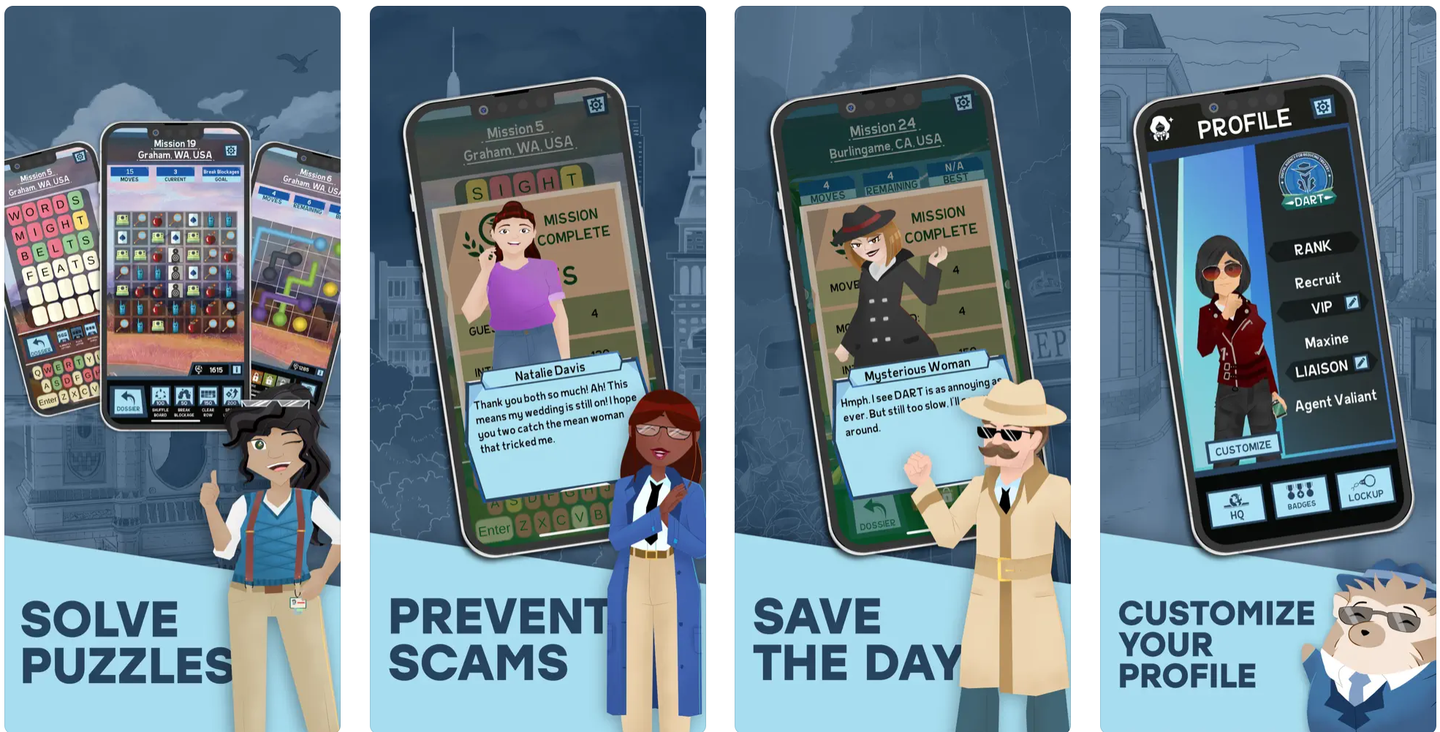“Deepcover” mobile app helps older adults spot and combat online fraud
In 2021, more than 92,000 U.S. adults aged 60 and over reported losses totaling a staggering $1.7 billion due to online fraud.

In DeepCover, players solve a variety of fun and stimulating puzzles to outsmart evildoers, prevent scams, and save the day. Playing as an undercover agent, players are awarded more intel at every level they complete, used to outsmart scammers and help protect potential victims. (CREDIT: Apple App Store)
In an age dominated by digital innovation and the rapid proliferation of online spaces, the internet has become an intricate web of opportunities and risks. With these opportunities come threats, and online deception, especially against older adults, has been on the rise.
According to the FBI's Internet Crime Complaint Center, in 2021, more than 92,000 U.S. adults aged 60 and over reported losses totaling a staggering $1.7 billion due to online fraud.
These alarming numbers necessitated a proactive response, and that response has materialized in the form of Deepcover, a free mobile app available on Apple's App Store and Google Play. Deepcover aims to empower older adults with the essential skills needed to navigate the digital world safely, offering an immersive and engaging learning experience reminiscent of classic spy films.
The development of Deepcover was led by Dan Cermak, the game studies coordinator in Informatics at the University of Illinois. Drawing from his experience in managing the development of successful commercial games, Cermak skillfully orchestrated the creation of this unique app.
Related Stories
A crucial aspect of its development was incorporating best practices from the world of commercial gaming, ensuring that Deepcover is not only educational but also enjoyable.
The National Science Foundation (NSF), through its Convergence Accelerator program, recognized the urgency of the issue and allocated $5 million to fund the development of tools that would aid older adults in protecting themselves from online deceptions.
The University of Illinois played a pivotal role in this endeavor, with Anita Nikolich, the director of research and technology innovation and a research scientist in the iSchool at Illinois, serving as a co-principal investigator on the grant.


Dan Cermak, Games Studies Coordinator and Anita Nikolich, Director of Research and Technology Innovation and Research Scientist. (CREDIT: University of Illinois Urbana-Champaign)
Nikolich, with years of experience in cybersecurity operations, understood the complexities of security gamification aimed at users and the need to create a game that not only educates but also entertains. She noted, "Our goal was to create a game that was fun and would teach older adults the basics of what can be very confusing lingo around digital threats."
Collaborating on this initiative were co-principal investigators from various institutions, including Natalie Bazarova from Cornell University, Dominic DiFranzo from Lehigh University, and Darren Linvill from Clemson University. This collective effort reflects the gravity of the issue and the need for interdisciplinary expertise to tackle it effectively.
In DeepCover, players are also able to customize their character, unlock new levels, play special training games, and learn additional info about real-life online scams and their impacts. (CREDIT: Apple App Store)
The primary challenge Deepcover addresses is the dearth of digital literacy tools specifically tailored to older adults, which has hindered their ability to protect themselves from online fraud. Many existing tools do not cater to the unique needs and concerns of this demographic. Deepcover fills this void by offering a comprehensive platform that covers a wide range of online schemes commonly encountered by older adults.
One of the unique features of Deepcover is its approach to teaching complex concepts in a user-friendly manner. For example, the app delves into common cryptography terms like "cipher," which essentially refers to a code used to disguise messages.
While this might sound daunting to those unfamiliar with the terminology, Deepcover presents this concept as a tile-matching video game, reminiscent of popular games like Tetris or Candy Crush Saga. By gamifying the learning process, the app ensures that users engage with the material in an enjoyable and interactive way.
Deepcover's missions, overseen by fictional secret agents such as Agent Daring, Agent Intrepid, or Agent Valiant, guide users through a series of progressively challenging tasks designed to enhance their digital literacy.
As participants successfully complete each mission, they receive a score along with remarks like "intel gained." This gamification strategy not only keeps users motivated but also reinforces their understanding of crucial digital security concepts.
The development of Deepcover was a collaborative effort involving Whitethorn Games and MenajErie Studio, both based in Erie, Pennsylvania. This collaboration contributed to the app's seamless integration of educational content and engaging gameplay.
DART is a cross-disciplinary, multi-institutional, user-centered effort to develop games to help older adults recognize and navigate scams. (CREDIT: University of Buffalo)
Deepcover is part of a broader initiative known as the Deception Awareness and Resilience Training (DART) program, spearheaded by the Center for Information Integrity at the University at Buffalo.
As Deepcover continues to gain traction on app stores and older adults embark on their digital espionage adventures, the hope is that the battle against online fraud will shift in favor of those who choose to accept the mission of unmasking deception.
Note: Materials provided above by The Brighter Side of News. Content may be edited for style and length.
Like these kind of feel good stories? Get the Brighter Side of News' newsletter.



